Farewells
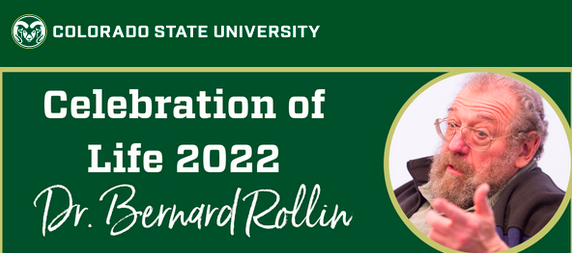
Colorado State University is celebrating the life and legacy of the late Bernie Rollin, a beloved University Distinguished Professor who passed away last year at the age of 78 after a 50+ year career at CSU. The university is hosting a memorial service for Bernie on Wednesday, Sept. 7, from 3-5 p.m. in the Lory Student Center’s Grand Ballroom. Registration for the service is available at col.st/M5zRB. Guests interested in speaking at the service are invited to sign up on the service’s registration page.
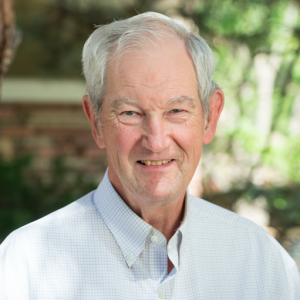
This year marked Dave Williams’ retirement from teaching Philosophy of Law each fall to a full house of Legal Studies students. A JD from Harvard Law, Dave brought expertise from over thirty years of private practice in Fort Collins, ten years as a State District Court Judge, and continued work after retirement as a senior judge. Despite such an impressive law career, Dave was always keen to learn from his students and adapt in the classroom. We’ll miss him and his wise and kind demeanor in the department.
Jo Ann Hedleston completed her phased retirement this year after teaching sections of Moral and Social Problems for two decades. During this time, Jo Ann was also a founding mother of the grassroots community radio station KRFC where she DJ’ed Morning Mix and Live @ Lunch. Jo Ann will be remembered for her boisterous laugh and joyous spirit.
Alumni News
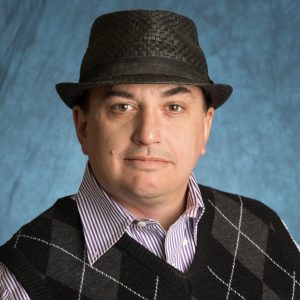
Nathanial Bork (MA 2009) recently completed a PhD in political science at CSU with the successful defense his dissertation, “Failure To Communicate: How American Progressive-Neoliberal Campus Policies Contribute to Conservative Mistrust of Higher Education and Skepticism Towards Research on Anthropogenic Global Warming” in May. David McIvor directed the dissertation and Phil Cafaro served on the dissertation committee.
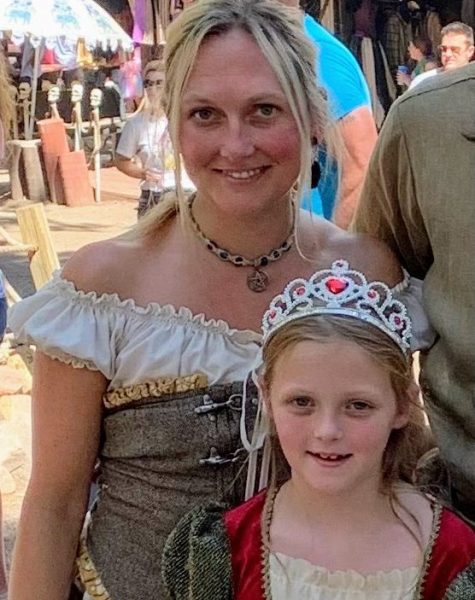
Wrapping up a year-long program, Alyson Huff (MA 2005) presented her project and became a Faculty Institute for Inclusive Excellence Fellow. She was selected to present at the College of Liberal Arts Student Success Professional Development Conference this summer, highlighting some of that work. For fun, Alyson enjoys traveling and being outdoors. She volunteers at a local CSA and for ‘nature walk’ at her daughter’s school. This year, she spent some time in Minnesota visiting family and celebrating her grandmother’s 89th birthday. She hopes international travel will be on the radar again soon.
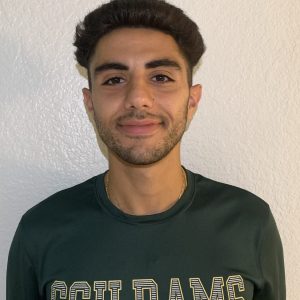
Aram Sahakyan (BA 2020) is attending the Antonin Scalia School of Law at George Mason University this fall. He is deeply grateful for his philosophy education at CSU and finds himself well prepared for the challenges ahead.
Emily Ward (BA 2017) has completed her position in the California State University System as an AmeriCorps VISTA Leader in a program focused on reducing race, class, and gender inequities in undergraduate STEM degree programs. This fall, she is joining the MA program in the Yoga Studies program at Loyola Marymount University and has accepted a graduate assistantship. With her partner and two cats, she’s excited to continue their “liberal, dirt bag existence of trying to make the world a little brighter.”

Faculty News
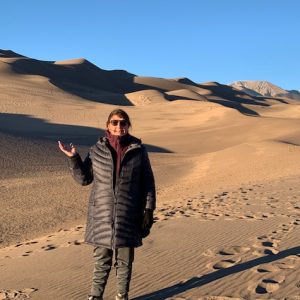
Laura Arcila Villa completed a 200-hour teacher training in postural yoga at the end of April, 2022. She enjoyed the opportunity to practice longer and in a deeper way, and to learn more about the history and yoga philosophies of India. Laura has also enjoyed some spiritual travel over the past year with summers spent in the northern Michigan forest and this past winter spent traveling the southwest, including Great Sand Dunes, Chaco Canyon, and the Petrified Forest of Arizona. Laura finds traveling and camping in wild places a wonderful tonic for body and mind and a humbling experience to be in the midst of such majestic places. Laura is looking forward to presenting at the annual conference for Quaker Studies this fall.
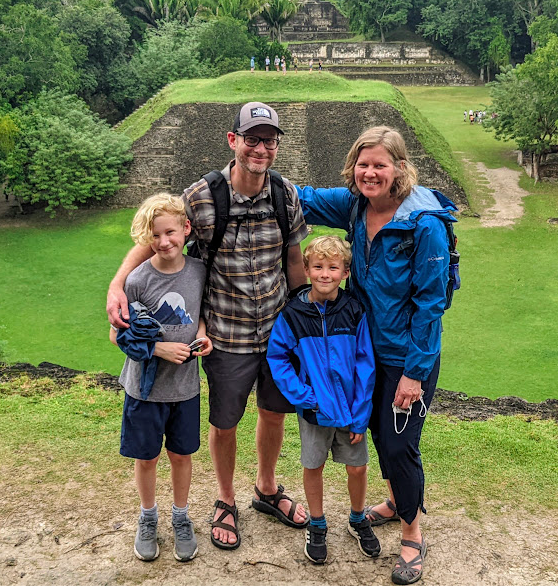
Ashby Butnor was promoted to Associate Teaching Professor in July. This year, she continued her service on many, many committees, including the department’s Assessment, Undergraduate, and Scholarship committees, the College’s Communications team and Equity Advocacy Committee, the Women’s and Gender Studies Executive Board, and the Faculty Council’s Task Force for the curricular development of the new AUCC course on diversity, equity, and inclusion. She’s looking forward to teaching a first-year seminar on Happiness for the Teagle-funded Green and Gold initiative this fall and taking students to Ghana in January with colleague Caridad Souza.
In May, Phil Cafaro traveled to Stockholm to participate in a workshop on “optimal global population” hosted by the Institute for Futures Studies. He stayed on in Sweden for five weeks, including time collaborating with ecologist Frank Götmark in Göteborg and demographer Lucia Tamburino in Vāxjö. He finished by attending the annual meeting of the International Society for Environmental Ethics on Seili Island, Finland, where he gave a paper and commented on two others.
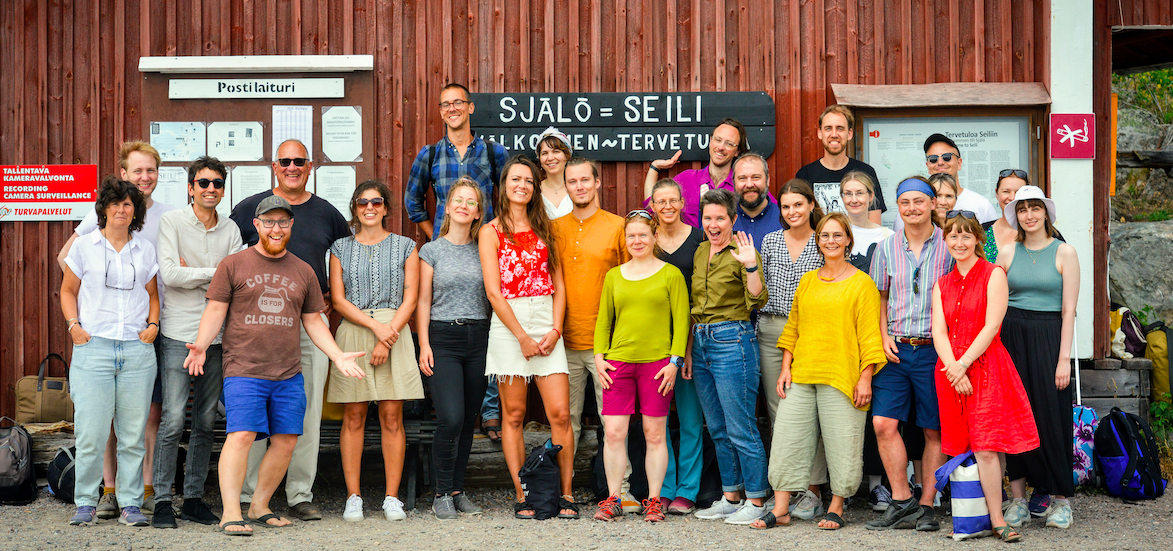
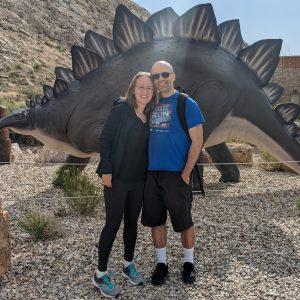
Paul DiRado spent the summer thinking about Boethius, a 5th century Platonist/ Aristotelian, the last Western Roman thinker of note and the last major philosopher in the west for a few hundred years. Paul is completing a chapter on Boethius’ account of what human beings can do when suffering injustice (and when suffering in general) for the Cambridge Critical Guide to Boethius’s Consolation of Philosophy. Paul also serves as the faculty advisor for both the Philosophy Club and the Minorities and Philosophy chapter at CSU.
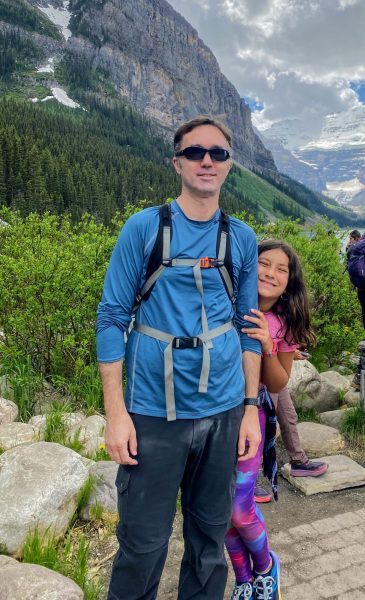
With his return to face-to-face teaching this year, Eric Easley was reminded of the joys and challenges of in-person instruction. He continues to refine his pedagogy to bring the lessons learned from pandemic teaching into his current courses. Eric started teaching our new computer ethics course with fellow alum Jesse Gray. They had a lot of fun engaging in new topics and applications of ethics with a mix of computer science and philosophy students. Eric spent another year coaching the Ethics Bowl team. After a winning streak last year, the team spent time working on strategy and recruitment for the coming year. This summer, Eric took trips to Pagosa Springs and British Columbia with his family, while teaching two classes online and running a Nietzsche reading group for the Ethics Bowl students.
This year, Moti Gorin was appointed to the inaugural leadership board of CSU’s Center for Ethics and Human Rights. Also, he published “Manipulation, Gamification, and Domination” in the Routledge anthology The Philosophy of Online Manipulation and co-wrote a review of Jennifer Blumenthal-Barby’s book, “Good Ethics and Bad Choices: The Relevance of Behavioral Economics for Medical Ethics, for the journal Ethics. Moti is on sabbatical in Maine for the Fall 2022 semester and under no circumstances should be contacted. He’s working on a book on manipulation and a couple papers on the ethics of pediatric medical care for gender non-conforming children and the ethics of nudges.
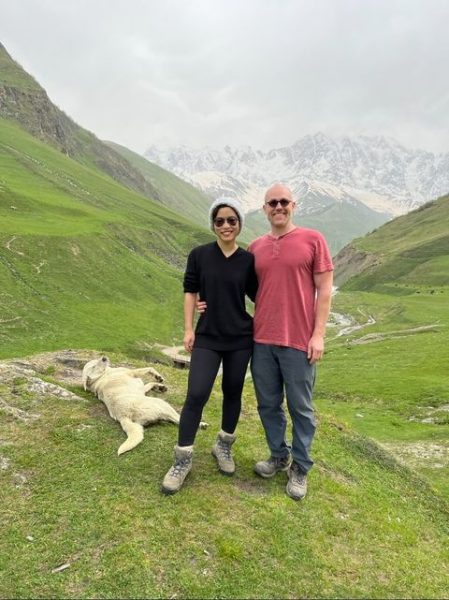
Eirik Harris is finding his footing in his first full year at CSU and has enjoyed being back in the classroom. In addition to teaching World Philosophies and East Asian Philosophies, he had the opportunity to teach a capstone seminar on Human Nature and Political Community and a graduate seminar on Political Realisms. The book he edited with Henrique Schneider, Adventures in Chinese Realism: Classic Philosophy Applied to Contemporary Issues, was published by SUNY Press in March. In October, he was invited to discuss his book on the Shenzi fragments at the Columbia Society for Comparative Philosophy, and in April he presented his paper on “The Huainanzi and its ‘Ruler’s Techniques’” at the American Philosophical Association meeting in Vancouver. Eirik and his wife Thai spent June exploring the Caucuses and drinking excellent Georgian wines. They’ll be spending the rest of the summer in Vietnam where Eirik will be working to finish off several writing projects.
Jeff Kasser spent much of the past year chairing the Undergraduate Committee and the search committee that eventuated in the appointment of Collin Rice as our new philosopher of biology. He is now prepared to admit that meetings are sometimes worth the trouble. He also reviewed two book manuscripts for Oxford University Press, agreed to organize and participate in the next installment of the Charles Peirce Society’s Internet Thesis Initiative, and joined an upcoming panel on Peirce and zetetic (inquiry-centered) epistemology. Not coincidentally, he has developed and will be teaching a seminar on zetetic epistemology this fall.
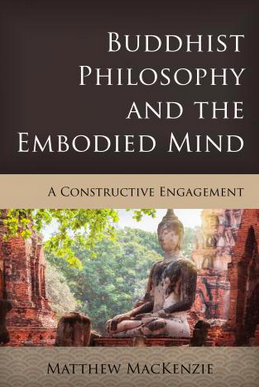 Matt MacKenzie was happy to return to a more normal campus environment this past year. In summer 2021, he presented (in person!) “Spiritual Animals” at the Institute for Religion in the Age of Science conference on Star Island, New Hampshire. In the fall, he published “Dual-Aspect Reflexivism in Śāntarakṣita’s Philosophy of Mind” in the Journal of Buddhist Philosophy and “Spiritual Animals: Sense-Making, Self-Transcendence, and Liberal Naturalism” in Zygon: Journal of Science and Religion. In the spring, he published “Meditative Experience and the Plasticity of Self-Experience” in the Routledge Handbook of the Philosophy of Meditation and presented “Emotion, Self-Knowledge, and Liberation in Indian Philosophy” at University College Cork, Ireland. His first book, Buddhist Philosophy and the Embodied Mind: A Constructive Engagement (Rowman & Littlefield) came out in June. He’s now hard at work on his next book, tentatively titled Consciousness in Indian Philosophy: Illuminating Mind, World, and Self with Bloomsbury. When he’s not answering emails or staring at spreadsheets, Matt enjoys spending time outdoors with his family and traveling. He’s also returned to his roots as a martial artist, taking up both jiujitsu and karate this year.
Matt MacKenzie was happy to return to a more normal campus environment this past year. In summer 2021, he presented (in person!) “Spiritual Animals” at the Institute for Religion in the Age of Science conference on Star Island, New Hampshire. In the fall, he published “Dual-Aspect Reflexivism in Śāntarakṣita’s Philosophy of Mind” in the Journal of Buddhist Philosophy and “Spiritual Animals: Sense-Making, Self-Transcendence, and Liberal Naturalism” in Zygon: Journal of Science and Religion. In the spring, he published “Meditative Experience and the Plasticity of Self-Experience” in the Routledge Handbook of the Philosophy of Meditation and presented “Emotion, Self-Knowledge, and Liberation in Indian Philosophy” at University College Cork, Ireland. His first book, Buddhist Philosophy and the Embodied Mind: A Constructive Engagement (Rowman & Littlefield) came out in June. He’s now hard at work on his next book, tentatively titled Consciousness in Indian Philosophy: Illuminating Mind, World, and Self with Bloomsbury. When he’s not answering emails or staring at spreadsheets, Matt enjoys spending time outdoors with his family and traveling. He’s also returned to his roots as a martial artist, taking up both jiujitsu and karate this year.
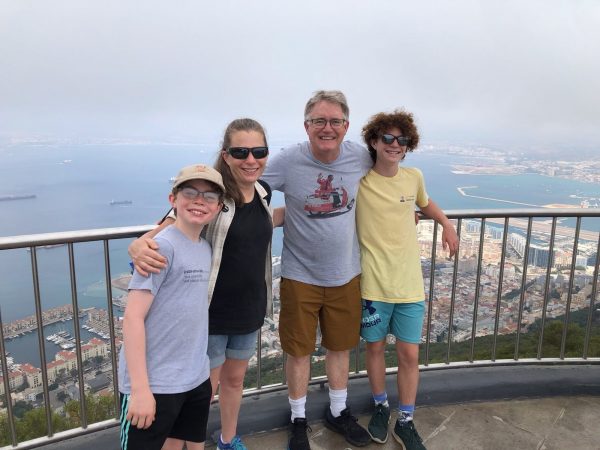
Katie McShane gave a number of regional, national, and international talks this year, including “Some Challenges in Teaching Climate Ethics” at the Society for Ethics Across the Curriculum’s annual conference in October, “Sustainability, and Climate Change” to the Women+ in Engineering Society at Strathclyde University in the UK in November, “The Place of Egalitarianism in Environmental Ethics” at an online conference, Moral Equality at the Margins, in January, “Toward a More Complete Assessment of Climate Impacts” at the annual meetings of Australia’s Royal Society for the Protection of Animals in February, “Egalitarianism in Environmental Ethics” at Colorado College in February, “A Basis for Biocentric Equality?” at the Philosophy Desert Workshop in Moab, UT in May, and a plenary talk at the World Biodiversity Forum in Davos in June on “Naturalness and the Value of Biodiversity.”
Katie also joined CSU’s new Center for Ethics and Human Rights as an affiliate, revised the Environmental Studies in the Liberal Arts minor with Ken Shockley, taught a new grad seminar on theories of citizenship and community in environmental ethics, and served on four MA theses as second reader, one PhD thesis (at Glasgow), and four thesis committees here as chair. In her spare time, she is building a five-string violin.

Domenica Romagni published “Cartesian Sensory Perception, Agreeability, and the Puzzle of Aesthetic Pleasure” in the British Journal for the History of Philosophy. She also gave a talk on music theoretical treatises as a philosophical genre as part of a conference between the University of Pennsylvania & Duke University on new narratives in the history of philosophy. She also worked to recover from a broken arm and her Sisyphean struggle to overcome the weeds in her new yard.
Kenneth Shockley spent much of the academic year writing a series of papers on vulnerability, developing material (including a graduate seminar) on environmental harm, and working on a book project, Narrative Ground. His published work this year included a paper on human flourishing in a time of climate change, a coauthored book chapter on the ethics of stream restoration, and another coauthored chapter on risk and the illusion of control. He presented papers at CU-Boulder, and at annual meetings of the Society for Human Ecology, the Global Mobility Humanities Conference, and the Congress of the International Development Ethics Association. He has enjoyed working with two CSU-based research collaborations: the Global Wildlife Values Project, and the Climate Adaptation Partnership. In May, after recovering from a number of administrative duties and after over a year of planning and preparation, he launched the Mountain Campus Program in the Environmental Humanities. The program provides intensive experiential education to small groups of students at CSU’s Mountain Campus. In its inaugural year, the program consisted of HIST355 North American Environmental History, E 403 Writing the Environment, and PHIL345 Environmental Ethics. He looks forward to building next year’s offering of the Mountain Campus Program.
A paper by Beth Tropman, “How to be an Aesthetic Realist,” was published in the journal Ratio.
